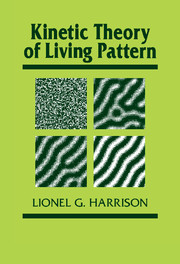Crossref Citations
This Book has been
cited by the following publications. This list is generated based on data provided by Crossref.
Cox, Edward
1994.
Getting into Shape:
Kinetic Theory of Living Pattern
. Lionel G. Harrison. Cambridge University Press, New York, 1993. xx, 354 pp., illus. $69.95 or £40. Developmental and Cell Biology Series, 28.
.
Science,
Vol. 264,
Issue. 5161,
p.
1010.
Holloway, David M.
Harrison, Lionel G.
and
Armstrong, John B.
1994.
Computations of post‐inductive dynamics in axolotl heart formation.
Developmental Dynamics,
Vol. 200,
Issue. 3,
p.
242.
Borckmans, P.
Jensen, O.
Pannbacker, V. O.
Mosekilde, E.
Dewel, G.
and
De Wit, A.
1995.
Modelling the Dynamics of Biological Systems.
Vol. 65,
Issue. ,
p.
48.
Ruuth, Steven J.
1995.
Implicit-explicit methods for reaction-diffusion problems in pattern formation.
Journal of Mathematical Biology,
Vol. 34,
Issue. 2,
p.
148.
Boissonade, J.
Dulos, E.
and
De Kepper, P.
1995.
Chemical Waves and Patterns.
p.
221.
Lee, Kyoung J.
and
Swinney, Harry L.
1995.
Lamellar structures and self-replicating spots in a reaction-diffusion system.
Physical Review E,
Vol. 51,
Issue. 3,
p.
1899.
Dulos, E.
Boissonade, J.
Perraud, J. J.
Rudovics, B.
and
De Kepper, P.
1996.
Chemical morphogenesis: Turing patterns in an experimental chemical system.
Acta Biotheoretica,
Vol. 44,
Issue. 3-4,
p.
249.
Díaz, José‐Luis
1997.
A patterned process approach to brain, consciousness, and behavior.
Philosophical Psychology,
Vol. 10,
Issue. 2,
p.
179.
Checa, Antonio G.
and
Jiménez‐Jiménez, Antonio P.
1997.
Regulation of spiral growth in planorbid gastropods.
Lethaia,
Vol. 30,
Issue. 4,
p.
257.
Harrison, Lionel G.
Donaldson, G.
Lau, W.
Lee, M.
Lin, B. P.
Lohachitranont, S.
Setyawati, I.
and
Yue, J.
1997.
CaEGTA uncompetitively inhibits calcium activation of whorl morphogenesis inAcetabularia.
Protoplasma,
Vol. 196,
Issue. 3-4,
p.
190.
Davies, P. W.
Blanchedeau, P.
Dulos, E.
and
De Kepper, P.
1998.
Dividing Blobs, Chemical Flowers, and Patterned Islands in a Reaction−Diffusion System.
The Journal of Physical Chemistry A,
Vol. 102,
Issue. 43,
p.
8236.
Holloway, David M.
and
Harrison, Lionel G.
1999.
Algal morphogenesis: modelling interspecific variation inMicrasteriaswith reaction–diffusion patterned catalysis of cell surface growth.
Philosophical Transactions of the Royal Society of London. Series B: Biological Sciences,
Vol. 354,
Issue. 1382,
p.
417.
Holloway, David M
and
Harrison, Lionel G
1999.
Suppression of positional errors in biological development.
Mathematical Biosciences,
Vol. 156,
Issue. 1-2,
p.
271.
Horovitz, Chaim T.
1999.
Biochemistry of Scandium and Yttrium, Part 1: Physical and Chemical Fundamentals.
p.
235.
Williams, R.J.P
1999.
What is wrong with aluminium?1This paper was given as the J.D. Birchall Memorial Lecture. I had a long standing friendship with Derek Birchall when we discussed many aspects of chemistry and life. He was a man of great originality and his early death was a blow to us all. I wish to acknowledge the compliment paid to me by asking me to give this lecture in Birchall's name.1.
Journal of Inorganic Biochemistry,
Vol. 76,
Issue. 2,
p.
81.
Dunn, Graham
1999.
The Biomedical Engineering Handbook, Second Edition. 2 Volume Set.
Vol. 19995277,
Issue. ,
Green, Paul B
1999.
Expression of pattern in plants: combining molecular and calculus‐based biophysical paradigms.
American Journal of Botany,
Vol. 86,
Issue. 8,
p.
1059.
Papaseit, Cyril
Vuillard, Laurent
and
Tabony, James
1999.
Reaction–diffusion microtubule concentration patterns occur during biological morphogenesis.
Biophysical Chemistry,
Vol. 79,
Issue. 1,
p.
33.
Papaseit, Cyril
Pochon, Nathalie
and
Tabony, James
2000.
Microtubule self-organization is gravity-dependent.
Proceedings of the National Academy of Sciences,
Vol. 97,
Issue. 15,
p.
8364.
Technau, Ulrich
Cramer von Laue, Christoph
Rentzsch, Fabian
Luft, Susanne
Hobmayer, Bert
Bode, Hans R.
and
Holstein, Thomas W.
2000.
Parameters of self-organization inHydraaggregates.
Proceedings of the National Academy of Sciences,
Vol. 97,
Issue. 22,
p.
12127.





